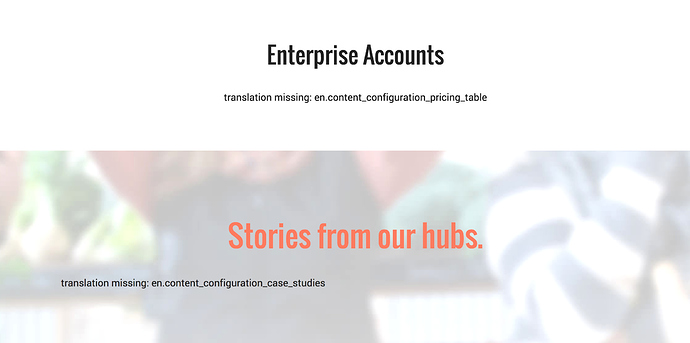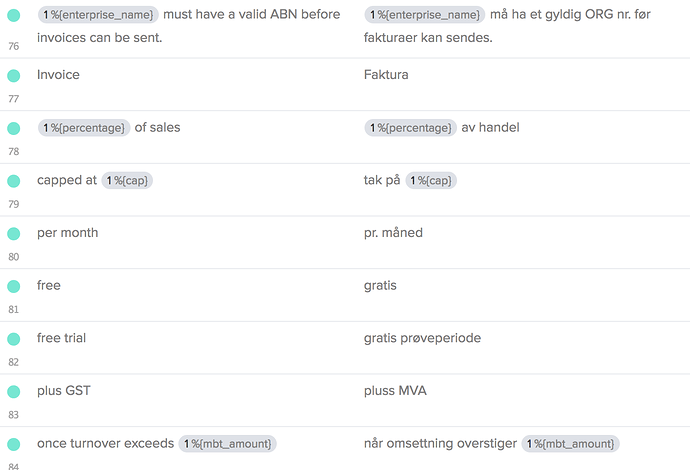Hey @tschumilas! I added Canadian French for you on Transifex. Couldn’t find Ojibwe on there, sorry. If you register an account with Transifex I can add you to the fr_ca translation project and you could have a look around.
So - what is my next step with this CAn French language file? Does this mean we are ready to go with multilingual (which we could do with the next update) Or is there something else I need to do to get this ready? @maikel
Also - do either of you know how to create a new language file that does not yet exist on Transifex (as you confirm @sigmundpetersen, Ojibiwe doesn’t exist. I think its something I could get funding to develop)
@tschumilas to enable multilingual a sysadmin needs to do as described here https://github.com/openfoodfoundation/ofn-install/wiki/Configuration#multilingual
You can have a look here on adding languages to Transifex
Hi Theresa,
I would like to explain a bit more to make the process and the next steps a bit clearer. As you know, translations happen at Transifex. Sigmund and I are OFN Transifex managers and can add new languages. Sigmund added Canadian French with the code fr_CA to our Transifex project. That means that people can translate from English to Canadian French. But a new language is empty, untranslated to begin with. So I now copied the French translation into the Canadian French translation to have a starting point. Canadian French is now “100% translated”, but it contains some text that is specific to France.
Action 1: Find people who would like to review all 2000 text pieces to see if they need to be tailored to Canada. They need to register at https://www.transifex.com/ and tell Sigmund (or me) their user names so that we can give them the right permissions.
While doing this, it would be very helpful to somehow collect the pieces that need changes on a separate list. Cynthia has this task on her todo list as well. You can work together.
Action 2: Once you are happy with the translation, we can add it to the next release and deploy that to your server. It needs a little change in a text file to activate that language.
Action 3: Ask the Transifex support about adding Ojibiwe. Once it’s available, we can add it to our project and people can start translating it as well.
Than you SO much @maikel. I think I now understand. So - I’m going to call out on my networks for a few people to work on translating the instance specific text. I imagine they will do that by looking at the English and new Can French side by side and identify inconsistencies. And, I’ll ask them to build a list of the sections/strings they had to translate - so we can contribute to the list @CynthiaReynolds has started. I’ll let you and @sigmundpetersen know once I’ve found a translator.
@tschumilas I also speak french… at least I used to! haha it is a little rusty after nearly 20 years in Norway - it now comes out with random norwegian words tossed in, which I only notice when the person I am talking to gets that look on their face  but I should be able to help if you run into any problems on the translation end. I just joined it on transifex
but I should be able to help if you run into any problems on the translation end. I just joined it on transifex
I also just put up a document on the drive to gather the strings and start documenting it: here
When trying to find the strings/location that supports the instance specific strings, I checked the USA site and see this:
these are located at strings 1776 1777, and I thought I might be able to locate the others from there, as using for search for original text is not working well for some reason or other.
Something seems to have changed, will have to check the USA sites translation as well. Will focus on these, as seen on the norwegian language transifex:
think I have figured out why the USA had errors, I checked some of the strings on the US language, and someone must have left out the ‘code’ part in the translation  we should make sure that we instruct new translators accordingly
we should make sure that we instruct new translators accordingly  @sigmundpetersen any idea where to put this in documentation?
@sigmundpetersen any idea where to put this in documentation?
fixing the ones I can find now:
Hi people
Just getting my head around this to understand implications for German translations. Have also just had quick chat to @maikel and summarising for the record 
What this thread really means is that there are a set of strings that are more than just a direct language translation, they actually represent a different meaning on a different instance.
So for now we handle them by building a google sheet that translators:
a) add to when they find something where they have actually had to change the meaning
b) use to identify strings they should think about / check w instance manager rather than just doing direct translation
In the medium to longer term this subset of strings may actually want to be isolated and handled elsewhere (perhaps in config?) so that the ‘core string’ can be edited and the translations read from there. Especially now that we have multi-lingual support, we don’t want to have to create new language files for every instance wanting to support a language so that they provide correct business model info in all languages!
@CynthiaReynolds @sigmundpetersen @tschumilas does that seem right?
The more that I look into it, the more that I see that the problem is about the html code included via SuperAdmin>Configuration>content
That is where the tables are that show the business model table when a hub wants to sign up… I went down the rabbit hole looking for that in transifex! - hence all the screen shots above  It has been so long since we did those translations I forgot where they were.
It has been so long since we did those translations I forgot where they were.
I am not sure how this area is handled when it comes to translations.
Each instance needs to determine what content they want to include in the various sections: Producer sign up pricing table, Hub signup table, case studies, and other content. Long term, this content (specifically the tables) may want to be standardised across the platform and grab the numbers from the business model section of configuration by SuperAdmin.
This information is not translated via language files at the moment. So on a multi-lingual instance, it would not be translated. The only workaround it so include all translations in these text fields.
We planned to make these fields translatable in phase 2. It would also make other user data like product names and enterprise descriptions translatable. But we haven’t started on that yet.
@CynthiaReynolds @maikel @Kirsten - I’m getting worried about getting the Canadian instance set up as bilingual (needs to be finished by late July - and we have received funding for it.) After a zoom call with @CynthiaReynolds I’ve come up with this plan - please comment:
- Cynthia and I wondered if we should just go with the France french translation (esp because @MyriamBoure is so quick to keep it up to date.) BUT a few French Canadian people have told me that it will ‘read funny’ in Canada if we do that. So - as @maikel stated above, I am currently finding someone to look at the 2000 strings in the Fr-Can transiflex file to make any necessary modifications. (If anyone knows someone in French-Canada who might do this - let me know.)
- As noted above, there is content that is not machine translated (business model in particular). I am going to re-write this content so those tables appear in both Eng/Fr - and I have contracted a translator to do this - later in July.
- None of the above ‘solves’ the problem of translating other pages on the Canadian website once we set them up (ie: blogs, newsletters…) For now - this will be only in English.
Once I accomplish step 1 (reviewing the strings in transiflex) - I presume @maikel - you can help with ‘making this so’ on the instance? One thing I don’t get – each time there is an upgrade - does someone need to do step 1 again? Or - really, I should have a volunteer arranged who looks through every new release as a language check?
Hi Theresa,
I can add Canadian French to your instance. That’s no problem at all. And each time there is an upgrade, somebody has to translate again. But fortunately, they don’t have to translate everything again, only the bits that changed.
I see. So - is there a way in the updating process that a list of strings that have changed is generated? I’m just trying to get a feeling for how much time this takes for every new release – so I can find a french canadian volunteer to take this on.
That service is done by Transifex. So whenever we change text in the openfoodnetwork code, Transifex notices that and says something like: Canadian French is 95% completed. So 5% was changed and needs translating again. A volunteer can just click on “translate” and gets the list of changed things. They can also use machine translation to have it all pre-filled and just correct the stuff that looks wrong.
@maikel and @CynthiaReynolds, meet @thibaultlanery - he is a French Canadian developer who has kindly agreed to do the translation of strings in transifex. @maikel - can you advise how he should proceed, and will he need access to our transifex account or something? Also - as I understand, we want to keep a list of the strings that required translation - so we can do this quicker next time - is that correct? Any help either of you can give to help get Thibault started would be very much appreciated.
- Head to Transifex and sign up: https://www.transifex.com/open-food-foundation/open-food-network/
- Ask me or Sigmund to promote you to be a maintainer of the Canadian French translation.
- Translate untranslated strings in Transifex.
- Review all strings and check for content differences as mentioned in Localisation, OFN in your language.
- List these differences and share them with Cynthia.




